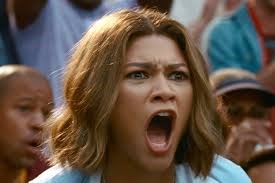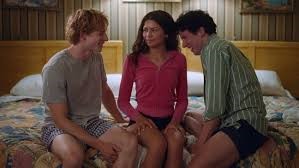
Now that we’re halfway through the year, I thought this would be a good time to acknowledge the best of what we’ve seen so far. Traditionally, the first half of the year can be kind of a wasteland when it comes to good movies. We generally see Oscar-bait movies get their wide release after the limited releases of December made them Oscar-eligible. February and March generally bring out a cavalcade of forgettable movies that are worthy of being neither Oscar-bait nor summer blockbusters. Kids are in school, the weather across the country is terrible, and most people would rather stay home and watch TV or do something streaming. We sometimes get a gem in April to whet our appetites for the blockbuster season that is just around the corner and is finally delivered in May and June.
This year, April brought us Challengers, a movie with a budding superstar in Zendaya and two up-and-comers in Mike Faist and Josh O’Connor. My daughter and I recorded a podcast on it when it came out that can be found here.

What you might find interesting in listening to that podcast is that it might sound like I really didn’t like it. I fully recognize that I am not the target audience for Challengers, but I can also appreciate what they did with the screenplay, even if I wasn’t a fan of the overall film.
This was an unconventional script and an unconventional film.
While I was not a huge fan of the movie, I really liked what screenwriter Justin Kuritzkes did in crafting the story. The movie is about tennis players in a love triangle, and Kurtzkes structured the story in much the same way as the back-and-forth of a tennis match. Anyone who follows tennis knows that when two evenly matched players face off against each other, the momentum of the match can go back and forth. Kurtzkes’ screenplay matches that flow very well over the course of the script.
This was an interesting one for me. After walking out of the theater, my initial reaction was that I didn’t like it. Then, after reflecting on it for a while and discussing it with my daughter on our podcast, I saw more value in the screenplay than I previously had. Kurtzkes and director Luca Guadagnino were not spoon-feeding us the story. They required us to watch and to pay attention to interpret it in our own minds. It was a smartly written screenplay that required active viewing from the audience. You had to pay attention to what was going on to appreciate the symbolism of what Kurtzkes and Guadagnino were doing. If you missed the symbolism, the screenplay would be diminished. If you got the symbolism, the screenplay’s greatness would be revealed.

From a nuts-and-bolts standpoint, the script did what it needed to do. It dripped with conflict, it created a dramatic third act, and it challenged the characters to learn and grow. Some of the characters learned and grew more completely than others, which is what needed to happen. Kurtzkes wasn’t afraid to put his characters in uncomfortable and even painful situations, and the movie was better for it.
Now, this still isn’t my favorite movie of the year, and that’s fine. I’m not the target audience, and people who I’ve spoken with who are in the target audience all loved it. Ultimately, the screenplay did what it needed to do. It just did it in a very unconventional way.